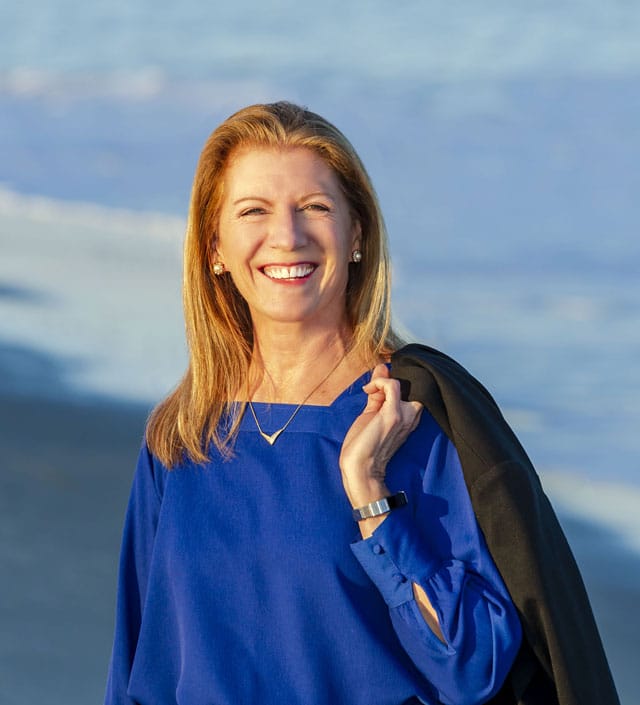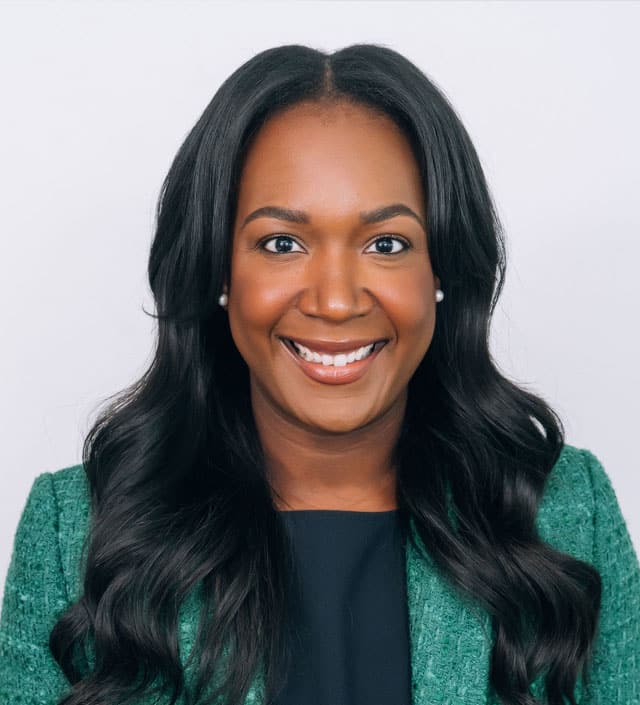Editor’s note: Catherine (Cathy) M. Seeber, recently named CAPTRUST’s 2024 Advisor of the Year, has long made it her mission to find better ways to serve clients holistically and to make the industry more welcoming for female advisors. Seeber, based in Lewes, Del., heads the CAPTRUST Women’s Initiative. She has held local and national leadership positions with the Financial Planning Association and with nonprofits, including a homeless shelter in her state.
Jerilyn Klein: Congratulations on recently being named CAPTRUST’s 2024 Advisor of the Year! How has it felt to receive this recognition for your hard work?
Catherine Seeber: What I like about this award is it’s more about supporting each other than about growing revenues or one’s own success. And what makes it so overwhelmingly special is it’s a peer voting system, not a top-down suggestion. CAPTRUST’s 650 advisors initially submit the name of an advisor they want to nominate, answering a couple of questions. Six finalists are then voted on after their contributions to the firm are highlighted. In a company this large, there are many phenomenal people doing phenomenal work.
I think my exposure helps: Besides chairing the CAPTRUST Women’s initiative, I put together a financial-planning focus group with one advisor at every CAPTRUST location [more than 80 across the U.S.]. The focus group lets us stay connected and share ideas to help us become better at our craft. Everything I’ve done throughout my career, even though I want to do it for the greater good, I’m learning. It makes me a better advisor.
Klein: You’ve been in the industry for more than 20 years, including seven at CAPTRUST. What initially got you interested in financial services and becoming an advisor?
Seeber: I was good in math, so I went that direction. First, I was a corporate accountant. But what really made me want to become a financial advisor was helping people. Like many people I speak with at membership events, I also got into the field because of a personal event. My mother was separated when I was 16 and I saw the effects of her not being able to tend to herself financially.
She couldn’t get a newspaper delivered to the house because she had no credit in her name; we couldn’t get a phone set up. We were forced to live with her mother — I left Virginia Beach and had to move to Upstate New York — in order to survive. My mother had no ability to earn the wages of a male, nor the credit needed to borrow in order to help us. I made it a personal mission that I would not only be different than that, but I would help other people.
Klein: The financial services industry still has a real challenge attracting women advisors. According to the CFP Board, they still make up just under 24% of CFP professionals. That’s lower than women’s representation among other professions, including doctors (37%) and accountants and auditors (60%). Why has the advisory industry lagged? What needs to be done?
Seeber: Sometimes the statistics do scare off women candidates. I did an article for the Journal of Financial Planning because I wanted to see for myself what the numbers were. And it was less about the development of financial planning programs at colleges — because as many, if not more, of the people that were sitting in the seats were women. College professors would tell me that the women were the most sought-after students for firm employment. So, I don’t feel like that’s the problem anymore. It’s not right-brain, left-brained mentality either, with regard to education. It’s how women are entering the field and where they go.
If they don’t have a good experience, they assume that the experience will be a similar situation no matter where they go. One thing we did through the Financial Planning Association, as an example, is we encouraged students and career-changers to shadow different advisors in different settings to determine where they felt most comfortable. I think there needs to be more of that. Women need to determine, based on their own personality, where they would fit in best, so they won’t have a negative experience and then just decide not to do it at all, ever again.
The CFP Board’s WIN program has helped, and I’ve mentored quite a few CFP certificants through that. I’ve encouraged them to go to as many membership organization events as they can so they can talk to more people and get more exposure. This field is so vast. It’s just like being a physician: You don’t have to like blood; you can be a pediatrician and fix the common cold. There’s a place [for female advisors], and we need to figure out how to place them better.
Klein: Why are women who’ve already established themselves as financial-planning professionals also leaving the profession?
Seeber: I could think of 1,000 different things. There are still unintentional biases. It’s not just our industry; it’s every industry. Women leave because they’re disappointed in the advancement when comparing themselves to their peers. I dealt with this too: I could see male advisors getting a title change or an opportunity, and I felt like I was overlooked. I didn’t know why this was, because my capabilities were the same as theirs, and I don’t think it was intentional. And I think we have to teach a lot of people making the decisions [at firms] to be better stewards — but, that’s another story.
 Another issue is the work-life balance that you spoke about in an article last year. One thing that bubbled out of the CAPTRUST Women’s Initiative was support for getting your CFP designation. We now have a CFP study group that’s not exclusive to women but it resulted from our conversations when we asked what they were struggling with, such as, “Well, I’m a mother of two, I’m trying to take my CFP and, oh, by the way, I still have to get new clients.”
Another issue is the work-life balance that you spoke about in an article last year. One thing that bubbled out of the CAPTRUST Women’s Initiative was support for getting your CFP designation. We now have a CFP study group that’s not exclusive to women but it resulted from our conversations when we asked what they were struggling with, such as, “Well, I’m a mother of two, I’m trying to take my CFP and, oh, by the way, I still have to get new clients.”
Women also leave because of the lack of internal mentorships – either one-on-one or peer groups — or the lack of the feeling of belonging, which are so important to someone that’s just starting out and trying to get confident. Plus, harassment still exists, whether intentional or unintentional. And in some organizations, the feeling of being undervalued or underutilized is another reason why they might leave. There are still cultural differences, too.
Klein: Can you give an example of what these cultural differences might look like?
Seeber: I say cultural differences meaning what appeals to somebody personally. For example, somebody may get tickets to a basketball game and ask only the guys to go, when a female advisor’s son plays for the team but she’s never asked. Last week, a woman advisor told me about people coming in for an event and the upper echelon — whether male or female — only invited the men. The differences in how we spend our free time carry into the socialization we’re having in the workplace, the conversations around the coffee pot. It’s like being on the kickball field and everybody is picking their team members and you’re the last one picked. We need to discourage traditional male-dominated company events and instead foster an inclusive environment. Everybody’s human and needs to be reminded.
Klein: Are women doing enough to support other women in the workplace?
Seeber: It depends. When I came to CAPTRUST in 2017, they had already talked about creating a women’s initiative and I was fixating on making that a goal of mine. Because earlier in my career, I saw some women who had become successful and didn’t want to see another woman thrive. Some women want to be the only one, like how we have alpha males out there.
What I have done with people that I respect very highly, who’ve really trailblazed the way, is to make every single female advisor feels as important as the other one. We are always trying to find ways to celebrate one another. That’s something women don’t do very often. Creating an environment where we not only support each other, but raise each other up — “It’s not about me, it’s about you” — that’s what we try to foster through the Women’s Initiative at CAPTRUST.
Klein: What else do firms need to do to encourage more women to stay?
Seeber: Provide encouragement for advancement, provide a safe place with zero tolerance, provide tools and mentorship programs, establish communities built for education, encourage activities to share and socialize, maintain an open-door policy, establish a pay system where everyone is equal, and encourage seats at the table. All of those things I think would help people from wanting to leave.
Klein: What has motivated you to stay in the industry and helped you succeed? Did you have mentors?
Seeber: My love for helping others and my continual effort to become better at my craft. I’ve had male and female mentors. Earlier in my career, I worked with some advisors who wanted to see me succeed and others that seemed to make it increasingly difficult, but that was not a necessarily a gender issue. What really helped me was getting involved outside of the office — in membership organizations, being part of the Financial Planning Association local board. I think I held every single position there before I became the first president of the Philadelphia Tri-State Area chapter. That was a big deal. Being appointed to the national board [of the FPA] was another big deal. My prior firm of 16 years highly encouraged membership activity.
I just kept feeling like I needed to learn more and the only way to do that would be to put myself out there and learn from a variety of people —male or female. It’s not going to come to you.
Klein: What else helped you become a better, more confident practitioner?
Seeber: When I first started at CAPTRUST, the people who helped me the most were the male advisors; they were always looking for ways to help me succeed. I was the second woman advisor who dealt exclusively in the wealth business so if a client wanted a female advisor, my colleagues often suggested me. Today, we have about 130 woman advisors working with high- net-worth clients.
I gained a lot of my knowledge through self-study, The Sudden Money Institute and being part of different communities. And I brought a lot of this back to my colleagues. As part of the financial-planning focus group [at CAPTRUST], we bring those kinds of conversations to the forefront so people can learn from each other. There’s so much talent and unless you open the door for conversation, no one is going to learn from each other. I’m grateful for that opportunity.
Klein: What suggestions do you have for female advisors, and really any advisors?
Seeber: The first thing I say when I mentor people through the CFP Board program is that they need to expose themselves to everything they can and just be a sponge to soak up as much as they can, because something is going to resonate with them that will help them develop their niche and hone their craft. I learned early on that I wanted to deal with people who were really suffering from change. “When money changes, life changes, and when life changes, money changes.” That’s a quote from Susan Bradley [of the Sudden Money Institute]. And I agree with that. It’s all about how you can help someone who is going through a major life event and making some of the costliest decisions — and potentially the wrong ones.
Klein: Your LinkedIn profile says that you’re “a financial life planner for individuals with uncertain financial lives.” To some extent, everybody’s financial life is somewhat uncertain. Are you talking about clients facing really big uncertainties, such as divorce and other crises?
Seeber: Yes, the largest transitions in life are divorce, sudden-money, inheritance. Some transitions are great — it’s not necessarily a bad thing. And as you said, you don’t know what’s going to happen tomorrow — so uncertainty should really resonate with every single person. Some people are dealing with those things two or three at time.
Ironically, the more educated I became in helping clients through tough times and life transitions, I was able to use those same tools in my own life and personal relationships. Success is not about the money but what you do with your resources that makes a difference.
Klein: How do you put yourself out there to find those kinds of clients?
Seeber: It’s largely word of mouth, from clients. But the other unique part about CAPTRUST is we have three different business lines — endowments and foundations, institutional, and wealth — that’s helped me, too. The sales component can be overridden by internally promoting yourself so that others understand your strengths and expertise so they know where you can fit into a problem they might be solving for. Becoming that go-to person, even if it’s in a smaller way, helps. Sometimes I help other advisors by jumping on a call with their client who’s having a really difficult time transitioning into retirement, and giving them tools and ways to feel better about it. I help people where I can, and somehow it just comes back to me.
I also get calls from people who say, “My mother-in-law just lost her husband,” or “One of my best friends just lost her husband. She’s got questions I can’t answer,” because the caller is an institutional advisor.
Klein: Many female advisors I know who focus on female clients are very happy and successful in their careers. What suggestions do you have for women who are interested in expanding their practices and looking to serve men as well? Is there anything different?
Seeber: I know some women feel more comfortable dealing with other women. I recently acquired a client couple and the male knew he would leave [die] before she. He set this up so she and I could establish a rapport and a comfort level. But I’ve had divorce situations where the husband needed more guidance. And at FPA retreats, I’ve also spoken with a lot of male advisors who early on suffered some personal situation that brought them into financial planning. So, it’s more of a personality thing than a gender thing, in my opinion.
Klein: Any additional thoughts on how to help women in the industry?
Seeber: No one should be left to struggle, together is better. Aligning with colleagues, male or female, and leaning in for support, does not make you weak; we are all human. Encouraging advisors to get to know one another on a more personal level helps, too. During Covid, we started peer-group calls to openly share the struggles we were dealing with. Just because we may look different shouldn’t make anyone feel inferior; it is a cause for celebration. And sometimes you have to pave your own way to gain confidence. Attending industry events and aligning yourself with likeminded individuals helps.
Klein: Cathy, what are your goals for the next couple of years?
Seeber: I want to get more information out to a greater number of people. And it’s by taking the time to talk to you, and putting pen to paper. I also want to be able to speak at different industry events, sharing my stories and thoughts on how we can be better advisors. And continual learning. I really have an affinity now on helping people with the struggles of aging. Plus, I don’t think I’ll ever stop trying to encourage an increase in the number of women advisors.
Jerilyn Klein is the editorial director of Rethinking65. This conversation was edited for brevity and clarity.







